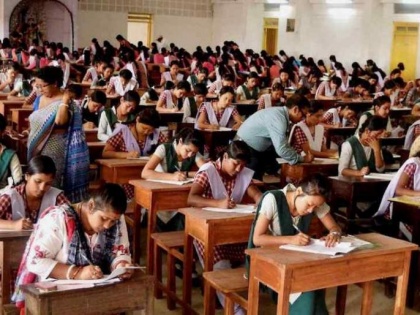National Education Policy 2020: How structure of school education and UG/PG Course would change
By Lokmat English Desk | Published: July 30, 2020 04:01 PM2020-07-30T16:01:18+5:302020-07-30T16:02:08+5:30
What exactly is the new National Education Policy 2020? The National Education Policy lays particular emphasis on the development ...

National Education Policy 2020: How structure of school education and UG/PG Course would change
What exactly is the new National Education Policy 2020?
The National Education Policy lays particular emphasis on the development of the creative potential of each individual. NEP 2020 emphasizes on ensuring universal access to school education at all levels- pre school to secondary.
The NEP 2020 is the first education policy of the 21st century and replaces the thirty-four-year-old National Policy on Education (NPE), 1986. The present Education Policy was adopted in 1986 which have been continued till date.
How is the pedagogical structure different from the existing one?
Currently, children in the age group of 3-6 are not covered in the 10+2 structure as Class 1 begins at age 6. In the new 5+3+3+4 structure, a strong base of Early Childhood Care and Education (ECCE) from age 3 is also included, which is aimed at promoting better overall learning, development, and well-being. It will include 12 years of schooling and three years of Anganwadi and pre-schooling.
Foundational Stage (3 years of preschool + Grades 1-2, covering ages 3-8)
Preparatory Stage (Grades 3-5, covering ages 8-11)
Middle School Stage (Grades 6-8, covering ages 11-14)
High School or Secondary Stage (Grades 9-12 in two phases, i.e., 9 and 10 in the first and 11 and 12 in the second) stages respectively, with an option of exiting at Class 10 and re-entering in the next phase .
NEP 2020 emphasizes on the power of language?
- NEP has given importance to mother tongue/local language/regional language as the medium of instruction at least till Grade 5, but preferably till Grade 8 and beyond.
- Sanskrit to be offered at all levels of school and higher education as an option for students, including in the three-language formula. Other classical languages and literatures of India also to be available as options.
- No language will be imposed on any student.
- Indian Sign Language (ISL) will be standardized across the country, and National and State curriculum materials developed, for use by students with hearing impairment.
How does the new assessment reform will work?
- All students will take school examinations in Grades 3, 5, and 8 which will be conducted by the appropriate authority. Board exams for Grades 10 and 12 will be continued, but redesigned with holistic development as the aim. A new National Assessment Centre, PARAKH (Performance Assessment, Review, and Analysis of Knowledge for Holistic Development), will be set up as a standard-setting body .
Will board exams be scrapped?
Board examinations will continue to be conducted at the end of Class X and Class XII by the different educational institutions. NEP aims to reduce the emphasis on board exams and the allied rote learning system. So the board exams won’t be the standard ones.
NEP 2020 aims to provide equitable and inclusive education
- Special emphasis will be given on Socially and Economically Disadvantaged Groups(SEDGs) which include gender, socio-cultural, and geographical identities and disabilities. This includes setting up of Gender Inclusion Fund and also Special Education Zones for disadvantaged regions and groups.
- Children with disabilities will be enabled to fully participate in the regular schooling process from the foundational stage to higher education, with support of educators with cross disability training, resource centres, accommodations, assistive devices, appropriate technology-based tools and other support mechanisms tailored to suit their needs.
What are the changes proposed for UG/PG course structure in the country?
What are the changes proposed for Bachelor's degree:
- NEP lays out stage wise distribution of the 3 to 4 year bachelor’s degree. A student would now have the option of multiple exit options – study for 1 year, 2 year, 3 year or 4 year. According to the same, the student would be offered a Diploma for 1 year education, Advanced Diploma for 2 year education, Bachelor’s degree for 3 year course and 4 year course.
- With multi-disciplinary approach, most of the bachelor’s degree would aim at becoming a 4-year programme with the fourth year adding to the ‘degree with research’. ‘The 4-year Bachelor's programme with multi-disciplinary education, however, shall be the preferred option since it allows the opportunity to experience the full range of holistic and multi-disciplinary education with focus on the chosen major and minors as per the choice of the student.’
- The undergraduate courses would be credit based and an Academic Bank of Credit or ABC would be available to digitally store the credit. Students would have an option to exit at different stages and also re-enter the higher education system, bringing with them the credits earned thus far.
What are the changes proposed for Master’s level:
- For master’s level, HEIs would now have the option of offering a 1 year master’s degree. They can offer a two year program where the second year would be devoted entirely to research for those who have completed an undergraduate degree of three years.
- For those students who have completed 4 years of bachelors’ programme with research, there would be an option of a one year master’s degree.
- 5 year integrated bachelors’ and masters’ degree would continue.
- For doctorate, the students who have completed their master’s would be eligible for pursuing Ph.D. The M. Phil programmer would be discontinued, as proposed by the NEP.
Open in app